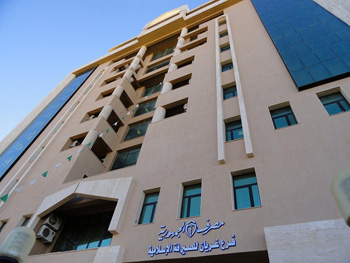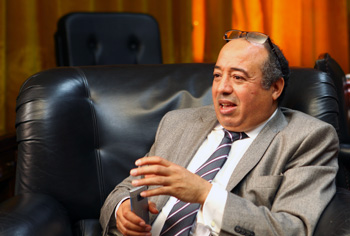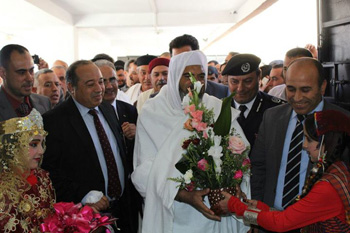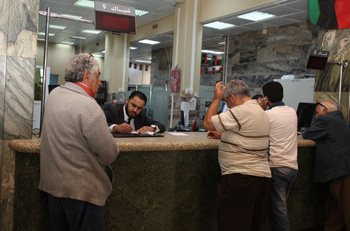Jumhouria Bank: Helping to finance the reconstruction of Libya
Libya Top Stories
Jumhouria Bank: Helping to finance the reconstruction of Libya
“It is the largest bank in Libya with a large volume of assets and good profits especially for the potential market in Libya,” bank General Manager Ahmed I. Rajab told Marcopolis. “This was especially true in 2012 based on a lot of contracts that have already been signed by the government and international companies, especially for construction and the infrastructure of the country.”

Jumhouria Bank: Helping to finance the reconstruction of Libya
By TK Maloy
TRIPOLI: Jumhouria Bank is the largest bank in Libya (retail) and was the result of a merger between Al Ummah Bank and Jumhouria Bank.
After the merger the bank now has a total capital of 1 billion Libyan dinar and total assets for 2012 of 33 billion Libyan dinars on the balance sheet and 12 billion dinars off the balance sheet for a total of about 44 billion Libyan dinars.
For 2012, Jumhouria generated a net profit of 240 Libyan dinars and distributed an 11 percent dividend to shareholders.
“It is the largest bank in Libya with a large volume of assets and good profits especially for the potential market in Libya,” bank General Manager Ahmed I. Rajab told Marcopolis. “This was especially true in 2012 based on a lot of contracts that have already been signed by the government and international companies, especially for construction and the infrastructure of the country.”
Rajab added, “There are many receivables and contractors who need money so we as a bank provide these contractors with facilities and we try to extend and increase their facilities to at least enable them to continue their construction work until the budget has been released.”
Jumhouria’s expectations are that the extension of loans and increasing of financing for reconstructions contractors will lead to a profitable bottom line for the bank.
Because the bank has no liquidity problems, it is in a strong position for financing projects and making loans.
“We are a very liquid bank. We have 14 billion Libyan dinars just in promissory notes of the central bank. We are just getting one percent from the central bank and this money should be granted to the individual market at least to contribute to the building of the country for the future,” Rajab said. “We should especially think about investing our money in the private sector to let the private sector contribute to the structure of the country.”
For Rajab, as Jumhouria’s general manager, the most important thing for running a successful banking operation is staff training. He noted that there was little or no investment in human resources under the Gaddafi regime, thus requiring a vigorous training schedule going forward.
“We must prepare our staff now,” Rajab said.
Rajab noted that because of the high liquidity position of the central bank, more money should be released to the market in order to stimulate faster economic growth. As part of this, the bank manager said that “some laws which should be reconsidered and amended by the general congress to enable us as banking sector to contribute to the investment side.”
“We need these changes to allow the banking sector to work freely with security. The money belongs to the people and we have to study properly where to invest the money,” Rajab said “In particular, most of the money is short-term funding and some investments right now should be long-term funding. So we have to do our best.”
Rajab added that part of the economic growth equitation is that many decisions on projects are pending at the level of the government ministries. He used as an example that the Ministry of Finance should designate places where new houses can be built in urban areas, a decisions which is still on hold.
“We have to get the proper license (either) for us or investors who would like to get the loans for building or the real estate in general. But they need the proper license from each municipality to enable investors to come to the banks or the banks themselves can’t get these lands,” Rajab said. “The government should take some steps to prepare or finalize some decisions or laws, especially with the municipalities in the area, at least to prepare some lands with infrastructure and change it from rural to urban area to enable investors to build and construct there.”
 Privatization
Privatization
“Libya should have one government bank. But for the other banks, they should be put on the stock market and sold to the private sector gradually after they do their 2011 and 2012 financial reports and financial statements,” Rajab said.
“Some international companies should probably do a proper valuation to determine the proper price for shares for the bank. Then it could be sold on the stock market here which would be much better. This can give opportunities even to international investors or local investors to take shares, thus improving the local stock market.”
Asked about investment into private banks, Rajab noted that investment should be open not just to Libyans, but also international investors.
Rajab added, “Also for the small banks which are already established in the market, the central bank should issue a law that should require the minimum capital required for those banks which are now outside of the regulations of the central bank in my opinion.”
Core Banking Tech
“This is the major problem for the banking sector and not just the banking sector, but for the government itself and any company or ministry. Unfortunately we have a lack of proper communication in the country itself,” Rajab said. “I joined the bank just one year ago and unfortunately when I came here, most of the problems stemmed from the core banking system which caused problems on a daily basis.
We also faced daily problems with our customers who think the failure was on our side, but unfortunately it is out of our control because it’s related to the poor communications system in Libya.
The general manager of Jumhouria noted that the bank has 150 branches but that only 85 of them have been connected to the fiber or wireless system and the rest of the branches are not linked at all by the core banking system “because they are in remote locations and there is no proper communication there.”
“So we don’t have any options to connect to them with the core banking system. They are still running on very old systems, each bank separately and therefore there are problems with collecting information, especially to create a balance sheet on a monthly or daily basis. It’s very difficult on a daily basis to get the information from the banks for example from the south or east of the country.”
According to Rajab, the government is working toward providing fiber optics communication links for all areas of the country.
Asked by Marcopolis about the recently establish electronic cheque clearing system, Rajab said “There’s a national payment system which has already been established at the central bank. It’s working now but not properly, especially if we don’t have all branches linked with the core banking system.”
A planned upgrade of servers and operating systems for connecting the servers with the core banking systems is in place, and Jumhouria expects it to be finalized by early summer.
“When this is done, many problems will be solved within the banking sector. At the same time, we are working toward having our own data center in the bank. We want at least two, with one as the main and the other as a backup,” Rajab said. “I expect that before the end of 2013 and also with the communication system we will try to do our best to provide the proper services to our customers with the proper data center and core banking system.”
There are about 20,000 persons working in the Libyan banking sector, of which Jumhouria employs 7,000 banking staffers.
Rajab forecast gradual growth for the sector over all, adding, “For Jumhouria, we expect 15 percent growth from year to year but for other banks I cannot answer. Profitability is growing but we are also trying to increase employee salaries.”
“When I took over this bank, I tried to find out how the average salary compared to the other banking sectors here, especially the government banking sector. It should be at least equal or within 5 or 10 percent,” Rajab said. “Before I became the general manager of the bank, I insisted on increasing the salary of the staff by 14 percent to be equal to the public banking sector, which includes National Commercial Bank, which already has affected our profit heavily with a staff of 6,500-7,000. This is a big amount – more than 70 million Libyan dinars.”
Also effecting Jumhouria’s bottom line is the fund established this year by the central bank as a guarantee on the deposits of the banks . In 2012, Jumhouria put 22 million Libyan dinars into the fund.
“So in addition to 70 million Libyan dinars for the increased salary, it came to 90 to 100 million Libyan dinars just for unexpected expenses. It’s not a small amount for a bank to increase from one year to the next. Also for 2013 this fund required about 34 million Libyan dinars from the bank, the Jumhouria general manager said.
For Rajab, as Jumhouria’s general manager, the most important thing for running a successful banking operation is staff training. He noted that there was little or no investment in human resources under the Gaddafi regime, thus requiring a vigorous training schedule going forward.
“We must prepare our staff now,” Rajab said.